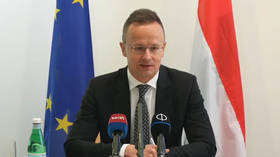EU state backs Chinese peace plan for Ukraine

Budapest supports Beijing’s proposals for resolving the Ukraine conflict, and believes there is “no solution to wars on the battlefield,” Hungarian Foreign Minister Peter Szijjarto said on Wednesday. He was soeaking following talks with his Chinese counterpart Wang Yi in Beijing.
The Hungarian diplomat expressed concern that the “pro-war camp,” supported by global media and NGOs, remains “extremely loud” and is undermining peace efforts.
“We support the Chinese peace plan, simply because it exists and calls for peace. And in our opinion, any initiative that diverts international political debates and international political discourse from war to peace is useful,” Szijjarto said in a statement following the talks.
“But we must be louder in supporting peace,” he added. “Both China and Hungary are strengthening the peace camp.”
Szijjarto previously claimed many leaders of EU and NATO member states are suffering from “war psychosis,” feeling as if they are already at war with Russia. He described the tone at a recent meeting of EU foreign and defense ministers as that of an army headquarters, where for hours “almost everyone was talking about how many units of what weapons and according to what schedule they are ready to supply to Ukraine” from stockpiles that are practically empty.
From the onset of the conflict, Hungary has been calling for a ceasefire and negotiations to save Ukrainian lives, with Prime Minister Viktor Orban insisting “time is on the side of the Russians” and that “almost nobody” believes that Kiev can actually win on the battlefield.
China has also long urged peace talks between Ukraine and Russia, and issued a 12-point peace plan to end the hostilities one year into the conflict, in February 2023. The initiative, hailed by Moscow, includes a call for a cessation of hostilities, a resumption of peace talks, abandoning the “Cold War mentality,” and respecting the sovereignty of all nations.
In contrast to Beijing’s proposal to end the fighting, Kiev’s ten-point peace formula – first presented by President Vladimir Zelensky in the autumn of 2022 – demands the complete and unconditional withdrawal of Russian forces from all territories within Ukraine’s 1991 borders.
Moscow has described Zelensky’s peace formula as an “absolutely hollow” ultimatum that is “divorced from reality.”














